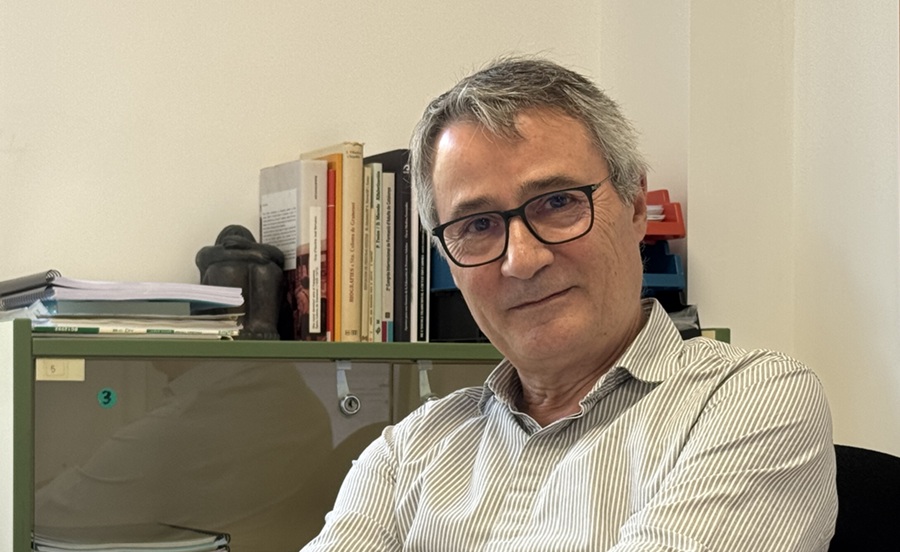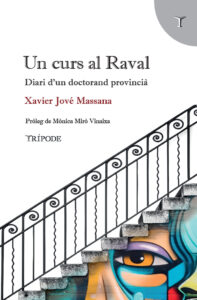- Literature
- 27 de October de 2025
- No Comment
- 13 minutes read
Xavier Jové: “Without literature, the world would be indecipherable”

Interview with Xavier Jové, writer and director of the Fondo Adult Education Centre in Santa Coloma de Gramenet. / Photo courtesy of the author.

Xavier Jové Massana (Bell-lloc d’Urgell, 1962) has just published Un curs al Raval: Diari d’un doctorand provincià (Trípode), with a foreword by Mònica Miró Vinaixa — a lengthy personal diary that stands out as an ambitious contribution to what is often referred to as “literature of the self”. Until now, he was known primarily as a poet: Tripulants (2004), Els 7 pecats revisitats (2011) and Epifanies (2022).

Who is Xavier Jover Massana?
Goodness, what a question to begin with! I suppose this book, like everything one writes, is really an attempt to approach some kind of answer—or perhaps, more accurately, a way of bearing witness to the impossibility of ever finding a definitive one about oneself. That said, acknowledging the fragmentary, mutable, and generally unreliable nature of the self, I would describe XJM as a citizen who received a public secondary education and forged his “sentimental education” in an era—the late seventies and early eighties—steeped in progressive values. Today, despite so many forces conspiring against it, I do my best to uphold certain humanist and Enlightenment principles that I consider non-negotiable. I do so as a father, as a member of my democratic community, as a writer, and as the head of a public educational centre.
Do you remember how and why you decided to start such an extensive diary?
The original manuscript of the diary, written during the 2009–2010 academic year, wasn’t that long. The project grew considerably during the revision process. I expanded certain entries—always trying to remain faithful to the original text—added the “lessons” (highly personal reflections on other diaries woven throughout the main narrative), and incorporated various other materials, including emails and other writings from that same academic year.
What does literature mean to you?
It is my most enduring and faithful passion—as a reader, scholar, teacher, and creator. A world without literature would be indecipherable, impoverished beyond imagination. That is why I am incensed that today’s educational system does so little to convey this marvellous and ever-renewing universal heritage. Literature is an irreplaceable school of the human condition, offering valuable lessons at every age. For me, whether writing or reading, literature is an inviolable exercise in freedom.
“Literature is an irreplaceable school of the human condition, offering valuable lessons at every age”
“There are periods in life when solitude clings to you like a tight-fitting garment you need to keep warm but which also constricts you”. How were those years?
The 2009–2010 academic year was a moment of transition for me—a turning point in my life. That’s precisely why I wanted to keep a diary that would record it. It was the year I began living in Barcelona and working in Santa Coloma de Gramenet, the year I finally submitted a doctoral thesis that had been years in the making, the year I embarked on adult education teaching… and yes, the diary also reflects moments of intense solitude, for I had neither a partner nor a family of my own at the time.
Why do you describe yourself as “a provincial citizen”? I don’t see it that way at all.
It is, in part, a narrative strategy. The narrator (who in a diary naturally coincides with the author) is someone who has just arrived in the metropolitan area from Tarragona. This allows for reflections on city life and comparisons with other environments. Moreover, from the subtitle onwards, I deliberately reclaim the adjective provincial and the historical or poetic resonances of the word province—a term that, in recent decades, has fallen somewhat out of favour in Catalonia.
“I reclaim the adjective provincial and the historical or poetic resonances of the word province—a term that, in recent decades, has fallen somewhat out of favour in Catalonia”
“Opposite me there’s a red-haired lady who seems to be proofreading some proofs”. You often observe people around you—the pensioner speaking of the Civil War, the Colombian labourers… Would you describe yourself as a Zola, a Cela, a Baudelaire, a Pla?
Oh, I would never dare compare myself with such great masters… What is clear, though, is that observation and writing share a powerful connection. Keeping a diary is above all an exercise in attention—an attentive gaze, a concept I confess I borrowed from Andrés Trapiello. Observing closely generates the need to describe, which is at once an objective and deeply subjective practice. Description, I believe, is always a challenge, one worth embracing.
“I’m trying to calm myself. Our minds manufacture utterly subjective anxieties”. Could you expand on that?
That passage represents the narrator’s lowest emotional point; later, after Easter and the completion of the thesis, he experiences a certain euphoria. In any case, the book carries a strong component of self-observation. I don’t only look outward—there is much introspection here, a clear desire to follow the classical maxim nosce te ipsum, employing tools from psychoanalytic practice when useful. Notice that I titled the book diari, not dietari, because the tone is predominantly intimate and autobiographical, rather than social or moralistic, though those elements are present as well.
Your doctoral thesis is something of a co-protagonist in your diary. What was it about, and how did you relate to it?
Indeed, this is significant. Curiously, only now, reading the printed text, do I fully realise that this book is, in a way, the story of the thesis—or even its continuation through different means. After a doctoral journey spanning twenty years (from 1990, after completing my degree, to 2010, defending the thesis), I then spent fifteen more years working on a diary attempting to justify it all. Mad, really. But the field was fascinating. I immersed myself in late-1920s and early-1930s Madrid through an intense episode of reception of German literature from the Weimar Republic—a substantial corpus of works published by the so-called editoriales de avanzada (Cenit being the most well-known, though there were several).
“I immersed myself in late-1920s and early-1930s Madrid through an intense episode of reception of German literature from the Weimar Republic”
These translations of Weimarian authors—Lion Feuchtwanger, Hermann Kesten, Heinrich Mann, Piscator, Erich Maria Remarque, Ludwig Renn, Anna Seghers, Ernst Toller, among many others—alongside the first Spanish translations of writers such as Hermann Hesse, Joseph Roth, and Stefan Zweig, reflect a progressive reception of German culture, short-lived and soon forgotten. The thesis bridged German studies, Hispanic studies, and cultural history, particularly book history, approached largely through the lens of the sociology of literary reception. Despite the challenges, I greatly enjoyed it.
Which Catalan publishers interest you?
Quite a few, actually. I won’t name them all here—I’d inevitably forget someone. But last September, at the Setmana del Llibre en Català, it was wonderful to see so many small publishers (can we still call them “independent”?) defending interesting, coherent catalogues and producing books with distinctive and carefully considered typographic personalities. As a reader, bibliophile, and scholar, I am especially drawn to literary series; and today, in Catalan, you can find superbly translated works of world literature from all eras.
Who is your favourite poet, and why?
I find it difficult to be categorical, but there is one author who has always fascinated me and profoundly influenced my youth, during a period when influences shape one profoundly: Gottfried Benn. His anti-sentimental poetics, his defence of artistic form as the supreme generator of meaning, his cynicism suffused with emotion, along with his ideological errors and distinctly uncomfortable life, make him an utterly singular figure.
You often speak of the “dismantling of public education”. How do you see this issue?
As I mentioned, I was fortunate to attend a state secondary school—the Martí i Franquès in Tarragona, which I have always cherished—and to receive a humanities-oriented education, essentially left-wing, of a conceptual calibre that today, from what I hear, it would be like science fiction. I recently spoke about this with a friend of my generation who studied at Puig Castellar in Santa Coloma. He didn’t pursue a teaching career like me; he worked at Nissan. Yet the solid cultural foundation he received—far nobler than the narrow idea of “competences”—has stayed with him. The potent cultural (and ideological) stimuli that working-class youth once encountered in these schools have vanished, representing a socio-cultural loss of great magnitude, whose consequences are yet to be fully seen. The cause is not only, as sometimes claimed, “society’s evolution” (though that is true), but primarily a series of educational laws which, since the introduction of the ESO (an educational framework that has consistently failed), have evolved from quaint eccentricities to pure absurdity—from pseudo-pedagogical whims to a denial of the most basic educational common sense—leaving behind scorched earth that has made us appear ridiculous for decades in all external evaluations, and even worse, a tool of social segregation that is today’s Catalan pedagogical system.
“The potent cultural (and ideological) stimuli that working-class youth once encountered in these schools have vanished”
Who are your literary models or totems?
Reflecting on the authors who have dazzled me over the years and narrowing the list to the most decisive influences, my personal canon would be: in prose or drama, Georg Büchner, Oscar Wilde, Kafka, Lampedusa, Borges, Italo Calvino, Thomas Bernhard; in poetry, Catullus, Garcilaso, Cavafy, Benn, Gabriel Ferrater, Gil de Biedma; in essay or criticism, Voltaire and José-Carlos Mainer. To keep it concise, I omit other classics who also inspired me, focusing on those who shaped me most in my youth.
Why Katherine Mansfield?
During 2009–2010, I befriended the excellent translator Marta Pera, who appears in the diary. She spoke of her translation of Katherine Mansfield’s diaries, which lay unpublished in a drawer. Years later, while revising my own diary and inserting the “lessons”, her translation finally appeared in print. I found this intertextual interplay between my diary and my subsequent reading of Mansfield rather charming.
What are you reading at the moment?
I have always been a slow reader, never a devourer of books. Currently, I am finishing a couple of volumes: Breve historia de Italia (1966, the now-vintage Colección Austral) and Volver a aprender (Plataforma Editorial, 2024), an illuminating essay on education by Andreu Navarra. I’ve also started a few little books I picked up at the Setmana: a Brecht anthology edited by Feliu Formosa (Trípode, 2025) and a new translation of Seneca’s On the Happy Life (Angle Editorial, 2025).
“The revision phase, as great poets have said, is every bit as important as inspiration”
Do you still write poetry?
Not really. Some years ago, the notebooks I always carried to jot down verses or sketches gradually fell out of use. It wasn’t deliberate, nor did I resist. The poetic muse may return. What I do continue is revising older material, which is also a form of writing poetry. The revision phase, as great poets have said, is as crucial as inspiration. One project I hope to tackle eventually is a book of sonnets. We shall see.
What are you working on now?
I have two fairly advanced projects, quite different in nature. First, a book of love poems inspired by Catullus, composed of older material, long in the planning, titled Fragments to Lesbia. It is a homage to Catullus—a personal reimagining of his voice in our own time.
Second, I am finalising a collection of writings on education—mostly short pieces written and published over more than twenty years. Some are pamphlets or libels in a Büchnerian or Voltairian spirit; others are more discursive essays. Beneath it all, however, the literary impulse predominates over the analytical. Fortunately, excellent scholarship now exists analysing the educational collapse of recent decades far better than I could, yet my modest contribution, Pedagocràcia, seeks to bear witness as someone who has seen this debacle up close, and who, at least, has the clear conscience of having always tried to resist it.
Source: educational EVIDENCE
Rights: Creative Commons

